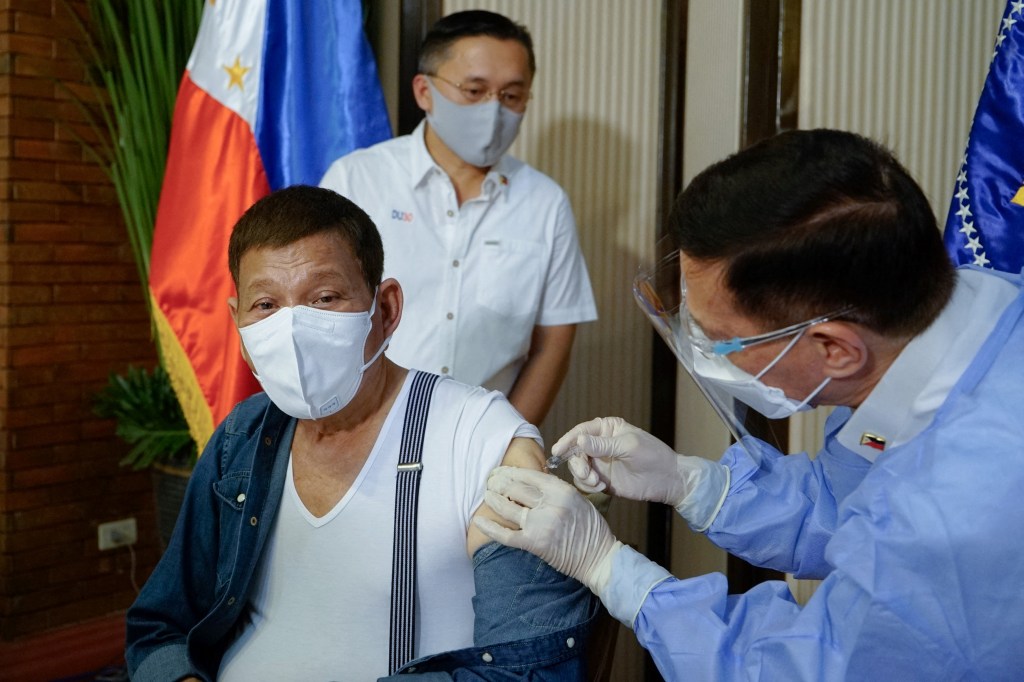As tensions rise in the disputed South China Sea, Philippine President Rodrigo Duterte took an unregistered China-made coronavirus shot on Monday evening, on the same day his foreign secretary dropped the F-word on Beijing.
In a Facebook live video, 76-year-old Duterte was inoculated with the Sinopharm vaccine, which does not have an emergency use authorization in the Philippines yet. Health Secretary Francisco Duque III administered the shot.
Videos by VICE
“I feel good and I have been expecting this shot, vaccination a long time ago,” Duterte said. He was also heard saying “camera” before receiving the shot, presumably to make sure the cameras were rolling.
The president’s publicized vaccination came months after critics demanded Duterte publicly take the jab to encourage Filipinos to get vaccinated against the coronavirus. Duterte’s approval rating rose to a record 91 percent in September and he has remained popular despite his government’s botched pandemic response.
Duterte previously said he would not want to take the shot in public as he would be taking a butt shot. He also said he preferred the Sinopharm or the Russia-made vaccine. For both issues, he did not elaborate why.
But critics were not amused when Duterte took the unregistered Sinopharm shot, alleging he was sending wrong signals to Filipinos by taking an unregistered drug. The U.S. Centers for Disease Control and Prevention has also said it’s not generally recommended for adults to get inoculated in the butt because of risks to the sciatic nerve.
Presidential Spokesperson Harry Roque on Tuesday defended the president’s choice, saying the leader did not violate laws as his vaccination was covered by compassionate use. He did not explain why Duterte did not wait for the vaccine’s registration or take a registered vaccine, such as the ones developed by Sinovac and AstraZeneca.
Duterte’s vaccination happened against the backdrop of rising tensions between Manila and Beijing over the lingering presence of swarms of Chinese ships, including militia boats, in disputed waters.
In an expletive-strewn Twitter rant on Monday, Foreign Secretary Teodoro Locsin, Jr. told China to “get the fuck out” of those waters. Manila also said it filed two diplomatic protests against Beijing over what it said was China’s continued harassment of Filipino vessels in the resource-rich waterway.
In response to Locsin’s tirade, the Philippine presidential office said that Locsin apologized to the Chinese ambassador for his language and said that only Duterte is allowed to curse.
Prof. Richard Heydarian, who observes developments in the South China Sea, said Duterte’s choice of Chinese vaccine shows his “desperate need to show that the country is indebted to China.”
“Duterte has nothing much to show for his acquiescence to China,” he told VICE World News. “Duterte said if you’re meek with China, you’ll get China’s mercy. Clearly, he is meek, but where is the mercy?”
Duterte, who claims to architect an independent foreign policy, often calls China a “friend” that promised him multi-billion dollar development aid, which has yet to be materialized.
“Duterte is embroiled in a massive crisis in the South China Sea. The situation is worse than before. His top lieutenants are up in arms in criticizing China,” Heydarian said. “They are using very aggressive language. This is an unprecedented word war between the two countries.”
The Philippines is grappling with strong vaccine hesitancy, which experts have tied to a dengue vaccine scandal in 2017. A study published in the medical journal The Lancet showed that vaccine confidence among Filipinos dramatically dropped from 93 percent in 2015 to 32 percent in 2018, the year the vaccine scandal exploded.
Today, six out 10 Filipinos do not want to get the coronavirus vaccine, according to a March 2021 survey.
The country was the last country to roll out vaccines in Southeast Asia and has so far inoculated only 1.9 million Filipinos as the coronavirus has claimed the lives of some 17,000 Filipinos and infected more than a million, making it one of the worst-affected countries in the region.







